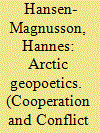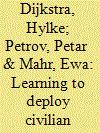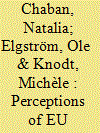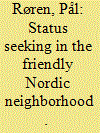|
|
|
Sort Order |
|
|
|
Items / Page
|
|
|
|
|
|
|
| Srl | Item |
| 1 |
ID:
170751


|
|
|
|
|
| Summary/Abstract |
The article develops a geopoetic approach to Russian Arctic politics. It rests on the empirical observation that due to climate change, the Arctic landscape is undergoing profound transformations, which has led to multilateral governance efforts but also unilateral pursuits. In this general heterogeneity, Russia’s policies have raised the most pressing questions regarding the country’s motivations to engage in the region. Cultural approaches to global politics are most suitable to create holistic understandings and explanations in this regard, but they lack discussing a spatial dimension of Russian identity. By developing a geopoetic account, the article complements this research through methodological insights from critical geography. Geopoetics focuses on the cultural roots and their cognitive-emotional dimension, on the basis of which claims to the Arctic and related policies resonate with a broader audience. The article argues that Russian policies have their foundation in a utopian ideal of Soviet socialist realism that was widely popularised in the 1920s and later decades. Applying the hermeneutic tool of topos, the article highlights that three features stand out that interweave into a coherent imaginary of the Arctic: first, the heroic explorer; second, the conquest of nature; and third, the role of science and technology. Analysts would do well to bear in mind how the Arctic becomes intelligible when commenting on policies.
|
|
|
|
|
|
|
|
|
|
|
|
|
|
|
|
| 2 |
ID:
170752


|
|
|
|
|
| Summary/Abstract |
A large share of civilian staff working in international peace operations are nationals of the host state. Academic research has not yet investigated the effect of these locally recruited bureaucrats on peacebuilding. Theoretically, it is argued that to accomplish their missions in complex environments, peace operations require crucial knowledge about local perceptions, politics, and customs. Local staff can have a positive performance impact by soliciting such knowledge. But information advantages create new principal-agent problems. Peace operations have a hard time scrutinizing their employees’ allegiances, and they risk sabotage from within. Empirically, it is shown that peace operations conducted by the United Nations (UN), the Organization for Security and Co-operation in Europe (OSCE), and the European Union (EU) differ significantly in how they navigate the ensuing tension by enabling or restricting the influence of their local staff. A new data set on the staffing of 52 peace operations as well as analysis of internal staff policies yields significant variance in the potential of local staff to influence peacebuilding policy implementation, which is most extensive in the OSCE, followed by the UN and the EU. This finding warrants more attention on the role of local staff as information gatekeepers who could be at the center of potential frictions between international and local norms and knowledge.
|
|
|
|
|
|
|
|
|
|
|
|
|
|
|
|
| 3 |
ID:
170754


|
|
|
|
|
| Summary/Abstract |
nternational organizations continuously deploy civilian capabilities as part of their peacekeeping and crisis management operations. This presents them with significant challenges. Not only are civilian deployments rapidly increasing in quantity, but civilian missions are also very diverse in nature. This article analyses how international organizations have learned to deploy their civilian capabilities to deal with a growing number and fast evolving types of operations. Whereas the previous literature has addressed this question for individual international organizations, this article uniquely compares developments in the United Nations (UN), European Union (EU) and Organization for Security and Co-operation in Europe (OSCE), three of the largest civilian actors. Drawing on the concept of organizational learning, it shows that all three organizations have made significant changes over the last decade in their civilian capabilities. The extent of these changes, however, varies across these organizations. The article highlights that the EU, despite its more homogeneous and wealthier membership, has not been able to better learn to deploy its civilian capabilities than the UN or OSCE. We show that the ability of these organizations to learn is, instead, highly dependent on institutional factors.
|
|
|
|
|
|
|
|
|
|
|
|
|
|
|
|
| 4 |
ID:
170755


|
|
|
|
|
| Summary/Abstract |
In conflicts between a state and a non-state actor, such as a paramilitary or terrorist organization, when no official diplomatic relations and recognition exists, there is a need for actors who can serve as a “diplomatic avant-garde.” This article identifies a diplomatic pattern in which breakthroughs occur through cooperative work between two types of actors: unofficial citizen diplomats and key figures in intelligence bodies. Each actor brings specific resources: unofficial actors have contacts with the non-state actor, while intelligence officers can offer backing from within the official system of the state. The article analyzes the topic using three case studies: Brendan Duddy and the MI6 officer Michael Oatley (UK and the Provisional IRA, 1975–1993); Willie Esterhuyse and the head of the South African National Intelligence Service, Neil Barnard (South African government and the ANC, 1987– 1990); and Gershon Baskin and the Mossad official David Meidan (Israel and Hamas, 2011). This study examines the unique relations between these two types of actors and how their collaboration promoted negotiations with non-state armed actors. It analyzes three stages: establishment of contact between these actors, persuasion of the relevant parties, and the breakthrough moment when talks shifted to an official back channel.
|
|
|
|
|
|
|
|
|
|
|
|
|
|
|
|
| 5 |
ID:
170753


|
|
|
|
|
| Summary/Abstract |
A small but growing literature has started to analyse the European Union (EU) ‘as an effective peacemaker’. We make a contribution to this field by investigating EU mediation effectiveness in the Russia–Ukraine conflict. The focus is on perceptions of effectiveness. Based on information from semi-structured interviews, we compare EU self-images with Ukrainian evaluations of EU mediation efforts. How effective is the EU, including its Member States, deemed to be? What factors are believed to lie behind perceived (in)effectiveness? We concentrate on four such factors, derived from the mediator literature: perceived (im)partiality, coherence and credibility and, finally, evaluations of the EU’s mediation strategies. Both internal and external views singled out EU member states as the most effective actors in current mediation. The role of EU was seen in ambivalent terms by both sides. All the four determinants of mediation effectiveness are discussed in our material, but differ considerably in the degree of attention given to each of them. While (im)partiality is not a factor that is linked to effectiveness in any straightforward way, EU incoherence is associated with inconsistent and weak policies, notably in the Ukraine material.
|
|
|
|
|
|
|
|
|
|
|
|
|
|
|
|
| 6 |
ID:
170750


|
|
|
|
|
| Summary/Abstract |
This article explores the scope conditions of national role conceptions as reference points for foreign policy decision making during crises. It aims to contribute to a refined perspective of the agency of new states undergoing socialization processes in relations with significant others. Drawing on a primary material consisting of interviews with Georgian and US officials, the article analyzes the significance of Georgia’s role conceptions in the country’s relations with the USA in relation to two major crises: the 2007 riots in Tbilisi and the 2008 war with Russia. The article posits that crises provide situational circumstances where the requirements of appropriate behavior associated with role expectations may enter into conflict with the demands of the immediate situation. In order to resolve ensuing role conflicts, actors face the need to both rationalize role expectations, and to compensate for departures from them. In turn, these strategies relate to the possibility for change and stability in role conceptions, and by extension their enactment in foreign policy. The analysis of the Georgian government’s management of the two crises demonstrates actions that implied both rationalization and compensation, aiming to retain the credibility of its existing role conceptions in the eyes of its US counterparts.
|
|
|
|
|
|
|
|
|
|
|
|
|
|
|
|
| 7 |
ID:
170756


|
|
|
|
|
| Summary/Abstract |
The article argues that the way status is pursued in social groups in world politics is contingent on the type of social relations that constitute interaction between the members. The Nordic region is a group of countries marked by friendship and trust. Here, the numerous societal linkages between the Nordic countries have made their region into a ‘friendly neighborhood’. This has changed the way that these countries pursue status. To explore this status dynamic, the article draws on a series of interviews with Nordic diplomats and argues that a strong friendship both enables collective status seeking, and constrains individual status seeking. Specifically, turning their social group into a friendly neighborhood allows the Nordic countries to posture as a collective polity and seek status on behalf of it. This grants them more status recognition in world politics. Moreover, friendship does not eliminate status rivalry, but it does turn it into a friendly kind of status competition. Indeed, while the intra-regional intensity of the competition endures, the article finds that the Nordic countries are unlikely to compete in ways that might harm their friendship or their neighborhood.
|
|
|
|
|
|
|
|
|
|
|
|
|
|
|
|
|
|
|
|
|